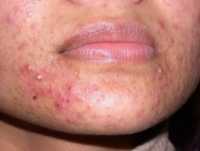
28 May Novel Bactericidal Gel Offers Promise For Antibiotic-Resistant Acne
MedicalResearch.com Interview with:
 Venkateswarlu (Venkat) Nelabhotla
Venkateswarlu (Venkat) Nelabhotla
President & Board Member
Vyome Therapeutics Inc.,
MedicalResearch.com: What is the background for this study?
Response: There are only a handful of antibiotics that are approved for use against the bacterial strain P.acnes that causes acne vulgaris. Because of the lack of new antibiotic treatment options, similar antibiotics are overused resulting in 1 out of 3 patients developing resistance against treatment, ultimately causing a decline in response rates. There is a clear unmet medical need for these patients; currently, patients do not have access to topical antibiotic treatments capable of an effective response without generating resistance. This study was designed to test the efficacy of VB-1953 in such moderate to severe acne patients, who were carrying resistant acne-causing bacteria and had failed to respond to currently approved antibiotics.
VB-1953, a bactericidal topical gel formulated antibiotic, differs from these older generation antibiotics in its novel mechanism of action, through which it can kill both sensitive as well as resistant bacteria, while also reducing inflammation . The earlier generation of antibiotics, including treatments like clindamycin, are bacteriostatic in action, i.e. they merely prevent the growth of acne-causing bacteria. VB-1953 is the first bactericidal antibiotic for the treatment of acne that kills acne-causing bacteria. VB-1953 also retards the development of resistance, and reduces inflammation associated with acne via an independent immunomodulatory effect.
MedicalResearch.com: What are the main findings?
Response: The use of topical VB-1953 resulted in a significant reduction (~57%) in inflammatory and non-inflammatory acne lesions (P<0.01) from baseline in these patients, who were not responding to currently available antibiotics. Microbiological studies in these patients confirmed a significant (>90%) mean reduction in their resistant bacterial count within one month.
MedicalResearch.com: What should readers take away from your report?
Response: The study shows that acne patients, who had failed previous antibiotic treatment and were positive for resistant strains of acne-causing bacteria, responded well to VB-1953 treatment. This novel bactericidal antibiotic gel opens up a new treatment modality for a large subset of resistant acne patients, representing 10 million patients in the US alone, who are failing their first line antibiotics treatment.
MedicalResearch.com: What recommendations do you have for future research as a result of this work?
Response: Personalization of medicine is happening across all disciplines. We believe that personalized dermatology is the future in our field. There is no reason why an acne patient who has clindamycin-resistant bacteria should continue to receive clindamycin treatment. Our study aims to be in that direction. For example, we have dialed into genetic testing for resistance in this trial as an inclusion criterion, which aided our push for a drug that can retard the development of new resistance, such as VB-1953.
MedicalResearch.com: Is there anything else you would like to add?
Response: While the acne antibiotics market in the US is genericized, the personalization as well as focus on the resistance space creates a new market opportunity that is ripe and overdue for innovation. We believe that is where the dermatology market needs to leapfrog, and that is how patients will see remarkable benefits.
Citation: Society for Investigative Dermatology (SID) abstract
https://www.sidannualmeeting.org/
608 A clinical study to test the efficacy of VB1953 in clindamycin non-responder acne patients with antibiotic-resistant P. acnes
Article in Journal of Investigative Dermatology 139(5):S104 · May 2019 with 1 Reads
DOI: 10.1016/j.jid.2019.03.684
[wysija_form id=”3″]
[last-modified]
The information on MedicalResearch.com is provided for educational purposes only, and is in no way intended to diagnose, cure, or treat any medical or other condition. Always seek the advice of your physician or other qualified health and ask your doctor any questions you may have regarding a medical condition. In addition to all other limitations and disclaimers in this agreement, service provider and its third party providers disclaim any liability or loss in connection with the content provided on this website.
Last Updated on May 28, 2019 by Marie Benz MD FAAD
